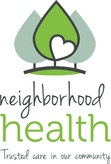| Challenges: The health care world is a continually changing one. Securing the future and financial stability of Neighborhood Health is challenging. As an organization very dependent upon federal and state funds, Neighborhood Health must be constantly alert and engaged in the legislative and governing process. As the debates about the Affordable Care Act and how the US will move ahead to assure a greater number of its citizens have access to healthcare, Neighborhood Health will continue to engage in the discussion and monitor the developments as they emerge. The local environment is equally challenging. Many larger local health organizations and entities can overshadow the importance of the work of smaller organizations and of primary care organizations. To address these issues, Neighborhood Health has a strategic plan to ensure that our organization implements changes and transformations that enable it to continue to be an important part of healthcare in the future and assure its viability as an organization and a valuable partner. These initiatives include: electronic health records, transformation to a 'healthcare home' model of care, updating and renovating facilities, developing innovative approaches to improve health outcomes and reduce emergency room use and hospitalizations among clients. Helping more clients address and overcome substance misuse challenges is an important challenge for us as we move forward. Opportunities: Neighborhood Health anticipates many opportunities, though some may be a couple of years off yet. Should Tennessee expand its Medicaid/TennCare Program as is possible through the Affordable Care Act, more than 50% of the uninsured cared for by Neighborhood Health would have access to this insurance program. This would mean significantly more resources for patients to achieve better outcomes, as well as for Neighborhood Health to develop programs and facilities. Other opportunities are working with partners. This can include local hospitals, as well as insurance programs who have a strong interest in cost savings. Neighborhood Health, as a primary care provider, is well placed to be a partner in reducing the cost of care to insurance and to the hospital. Several partnerships are in the development stage. Neighborhood Health is well positioned to expand to meet community primary care needs and will continue to identify strengths and address concerns to remain a critical part of the local healthcare landscape for the future. |

